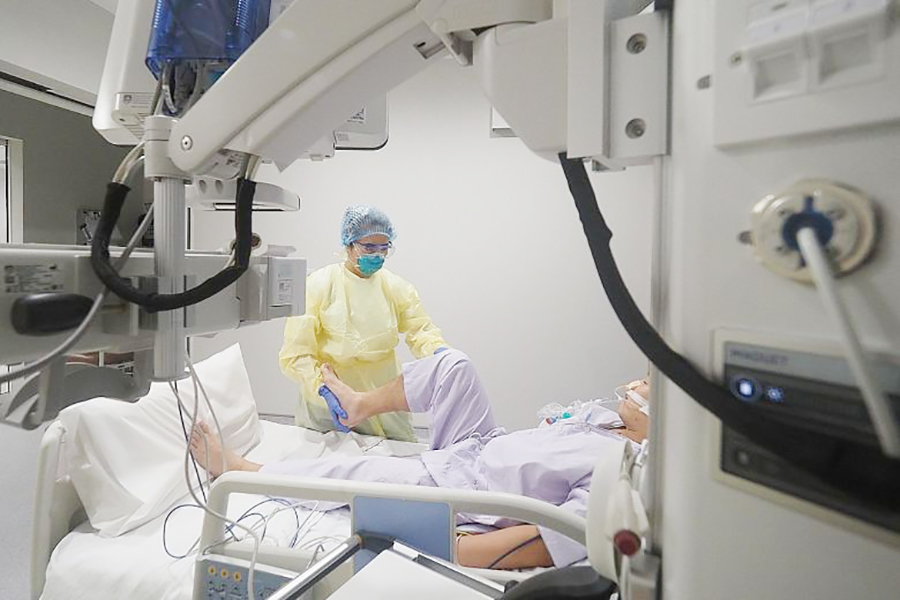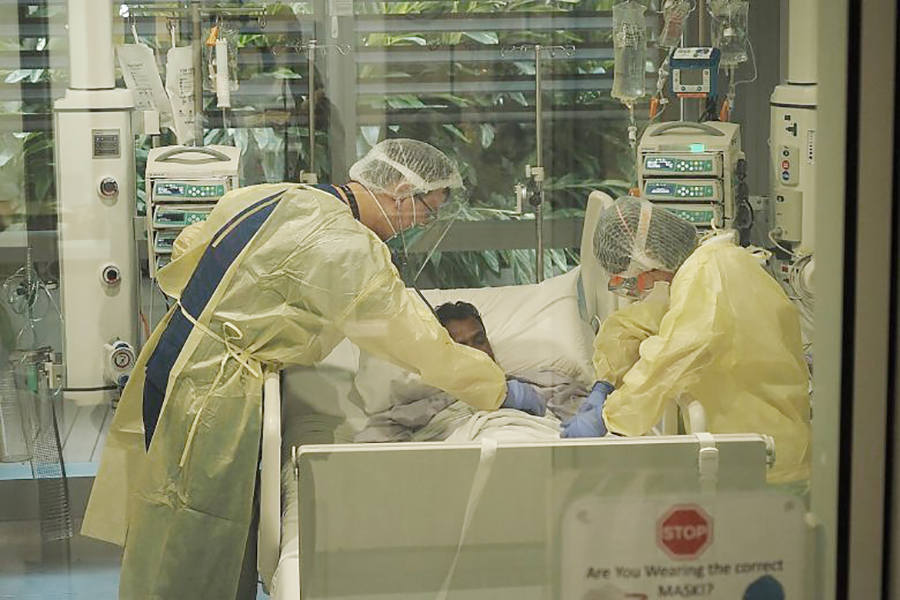 An ICU patient getting physiotherapy. The ICU at NCID is manned by specialists, doctors and other healthcare workers from various departments. PHOTO: TTSH-NCID
An ICU patient getting physiotherapy. The ICU at NCID is manned by specialists, doctors and other healthcare workers from various departments. PHOTO: TTSH-NCID
At the intensive care unit of TTSH-NCID, healthcare workers make critical decisions daily to save a more vulnerable group of patients debilitated by Covid-19
The Straits Times (26 July 2020)
There have been no Covid-19 patients at the intensive care unit at the National Centre For Infectious Diseases (NCID) since June 15.
Associate Professor Tan Hui Ling is praying hard it will continue to remain empty.
"I hope that people will be responsible so that there are no new waves of infections. You do not want to end up in the ICU because of Covid-19. It's a very horrible experience," says the senior consultant in the department of anaesthesiology, intensive care and pain medicine at Tan Tock Seng Hospital (TTSH).
Dr Tan, 50, says: "Many can't breathe. To help them breathe, we put a tube down their voice box, and when they wake up, it can be a very scary thing if they're not prepared for it because they can't talk.
"Sometimes we have to put a line in the neck, and another in the arteries. These are all procedures which can have complications."
Critically ill Covid-19 patients are often sedated and paralysed to prevent them from moving, she adds.
Dr Tan is chairman of the hospital's ICU committee and played a key role in getting the intensive care unit at TTSH-NCID Covid-19 ready.
For the last six months, she has been beavering alongside other
frontline health workers in the ward to save the lives of scores of patients debilitated by the severe acute respiratory syndrome coronavirus 2 (Sars-CoV2) - the
virus that causes Covid-19.
The symptoms of the disease - which has
infected more than 15 million and killed more than 600,000 worldwide since rearing its ugly head late last year - vary.
While most people display mild or even no symptoms, many others - especially those who have underlying medical conditions - can end up in the ICU fighting for their lives as they battle, among other afflictions, respiratory failure, septic shock and multiple organ dysfunction or failure.
Just ask Mr Wong Shin Liang, 71, who was hospitalised for nearly 70 days, and warded in the ICU three times after being diagnosed with the coronavirus in early February.
Among other complications, the diabetic had pneumonia, needed to be put on a ventilator and suffered severe intestinal bleeding.
His daughter, Ms E.H. Wong, says: "He had many bags of blood transfusions."
 Medical staff attending to an ICU patient at the National Centre for Infectious Diseases, which became the designated ground zero for Singapore's response to the coronavirus when it surfaced here in late January. PHOTO: TTSH-NCID
Medical staff attending to an ICU patient at the National Centre for Infectious Diseases, which became the designated ground zero for Singapore's response to the coronavirus when it surfaced here in late January. PHOTO: TTSH-NCID
Last line of defence
The National Centre for Infectious Diseases (NCID) - which took over the functions of TTSH's former Communicable Disease Centre last year - became the designated ground zero for Singapore's response to the coronavirus when it surfaced here in late January.
The self-contained facility can be locked down to manage highly infectious agents during a big outbreak. The country's largest screening centre - run by TTSH's Emergency Department and capable of screening nearly 300 cases daily - was set up at the facility. NCID's resident ICU was prepped and equipped to deal with the virus too.
If the screening centre is the first line of defence in the fight against Covid-19, then the ICU is the last. Here, healthcare workers make critical decisions daily to save a more vulnerable group of patients debilitated by the virus while ensuring that more critical care is readily available as the situation evolves.
Preparations to get the ICU Covid-19 ready began in earnest around Chinese New Year. The patients who were there were moved to TTSH's regular ICU, the space was expanded and the number of beds increased from 10 to 38.
The unit's director Benjamin Ho says: "We heard that in China (the coronavirus patients) were not going to normal wards but the ICU."
The unit received its first two patients on Feb 5. Since then, scores have been warded and treated at the unit, including Mr Wong and
Bangladeshi migrant worker Raju Sarker (Patient No 42) who fought for his life and was discharged five months after contracting the virus. There have been 15 deaths from Covid-19 at TTSH-NCID.
At its busiest, more than half of the beds in the ICU were occupied.
The ICU is manned by specialists and doctors from various departments. Associate Professor Ling Limin, a senior infectious diseases consultant at NCID, says: "We have cardiologists, neurologists and intensivists, we are really multi-disciplinary."
To cope with the pandemic the ICU medical team was beefed up threefold, with deployments from different departments in TTSH.
For instance, the 75 ICU nurses at NCID were augmented not just by their peers at TTSH but also 33 ICU nurses from other public healthcare institutions at end-March.
Nurse manager Lorraine Tan says her ICU staff come from different training backgrounds. "As the NCID ICU admits patients from all disciplines, the challenge lies in ensuring versatility in the daily manpower allocation to match the type of nursing care needed."
Challenges
Fighting the beast that is Covid-19 is fraught with challenges, not least because the disease is new. To begin with, weeding out suspected from actual Covid-19 cases was no walk in the park.
Dr Tan says: "We had a situation where if anyone became critically ill, we had to ask ourselves if he or she was ill with Covid or had a stroke and had Covid at the same time? If the patient came in with a heart attack, was it related to the Covid? It was a heterogeneous group. In normal times, they would have just gone to normal patient ICU. But we had to be very careful not to start a cluster if we sent them to the general ward."
Putting on the personal protective equipment (PPE) takes at least 10 minutes. To avoid degowning, many frontline healthcare workers train their bladders or avoid drinking too much water so that they do not have to go for toilet breaks.
Dr Tan points out: "It is really important to put the PPE on correctly because patients will cough and you cannot tell them not to. You also cannot take three steps back when they do, because it will be very bad for patient morale. In the course of care, you want to connect with the patient.
"When we go in, if the patient can talk, we talk. If they can't, the first thing we do is to hold their hand."
The unwieldy protective gear also makes the delicate job of handling severely ill patients more difficult. For example, turning an intubated patient prone - to improve oxygenation - can take half an hour, since the different life-sustaining lines are connected.
The sheer infectiousness of the disease also means the medical team have to think through their movements to reduce exposure.
"For example, if we need to examine a patient, we have to decide who is the most suitable to do it and what you need to examine," Dr Tan says.
Dr Ling remembers seeing an exhausted colleague early one morning. "He looked so spent. That's because he'd spent the whole night keeping Raju alive," she says referring to the Bangladeshi migrant worker who spent five months in NCID and TTSH.
She says: "We thought he'd be the first to go; he had everything you could think of - from sepsis to fungus in the blood."
Emotional support
Treating Covid patients is not just physically taxing, it is also emotionally draining.
Dr Ho Lai Peng, principal medical social worker, spotted a need to help the families of Covid-19 patients in the ICU whose visits are highly restricted to keep the virus from spreading.
While sensible, this step can be hard for a patient's family to take, says Dr Ling.
"Even if a patient cannot hear, it's good for loved ones to see them. They feel they are doing something and it can help to reduce helplessness."
But now, that is no longer possible. "Lai Peng's role helped us to think about what families and next of kin were thinking about and how we can assure them," she says.
Dr Ho says that many of the calls she makes to the loved ones - especially those under quarantine or serving Stay Home Notice - of patients inevitably end up in tears.
"I have another colleague doing this with me. We do whatever we can to ease their anxiety. It means a lot to them that someone from the hospital is listening to their pain and sadness," says the social worker who even arranged Zoom calls for families to keep vigil over their loved ones.
The toughest part, she says, is helping them cope with patients who do not make it.
"You have to let them know that when the patient dies, they won't be able to see him or her anymore. The patient has to be double-bagged and put in a closed casket," she says, referring to protocols on the handling of fatalities from the coronavirus.
Dr Ho has seen seven deaths in the NCID ICU over the past six months. One of the hardest things she had to do was helping an elderly woman - also a Covid-19 patient - cope with the death of her husband.
"When he was dying in the ICU, we arranged a video call for her and their only son, who was overseas. She was grieving so badly. She had known the husband since she was 15 and he was her best friend and now he's gone. I had to help her claim his body from the morgue and arrange the funeral. The undertaker did a live video so that their son could say goodbye virtually to his father."
Thankfully, most patients in the ICU had happier and better outcomes, with some, like Mr Raju and Mr Wong, pulling off miraculous recoveries.
Dr Ling recalls: "The mood of the ICU really turned when Mr Raju's kidney function improved and his blood pressure stabilised. It was a triumph."
Ms Audrey Lee remembers Mr Wong well. The 29-year-old senior physiotherapist is part of a small team of cardiopulmonary physiotherapists deployed to work with Covid-19 patients in the ICU.
Mr Wong was the first coronavirus patient she worked with, and was quite different from other patients she was used to seeing.
"Whatever information on working with Covid-19 patients we had at that time came from China. It was only after working with him that official guidelines came out but we were not far off."
Mr Wong, she says, could not sit upright and needed a ventilator to breathe. She adds: "He was very anxious that he could not come off the oxygen, and anxiety contributes to breathlessness. We had to use everything in our book to not only rehabilitate him but help him with his emotions as well."
All ICU frontline workers interviewed agree that the past six months have been gruelling.
But in banding together to save lives, they also now share a new level of intimacy and intensity, says Dr Tan. "Everyone is working and thinking about cases. I get messages at midnight asking if I have read this or that paper, people are sharing information about everything from clotting to diabetes because of Covid-19.
"It has brought everyone together."